Mitigating the impact of climate change is now a top priority for government – and, therefore, business – with transport and packaging among the primary areas targeted for transformation. Dominic Weaver spoke to a selection of Affiliates about some of the environment-focused initiatives in the moving industry
A UK newspaper cartoon published at the beginning of the pandemic depicted COVID-19 as a tidal wave about to engulf the world, followed by a second, larger ‘global recession’ swell. Rising close behind these two was a third, far larger wave: ‘Climate change’.
If you still don’t know exactly what climate change means, and its direct and legislative implications for companies, read the panel ‘Why does it matter to business?’, on page 29. If you do know, then it’s highly likely you are one of the FIDI Affiliates reimagining your firm in myriad ways to reduce your carbon footprint and make it environmentally sustainable.
In an industry where road, air and sea transport across international borders, plus a lot of packing material, are central, this means substantial change is under way.
The international moving industry is made up of many family firms for which sustainability, in its broadest sense, is key. Fourth-generation business Streff, for example, reminds itself of its sustainability goals at the entrance to one of its premises, with a large granite sculpture of a foot on its tiptoes, alongside the motto ‘Large foot, small footprint’.
The company’s management board member Max Neumann says: ‘It is our intrinsic motivation to foster a sustainable triad of an economically viable, ecologically friendly and socially engaged business. We want to protect the quality of life we as a society currently enjoy, and do our bit to conserve it for future generations. This can only be done with a sustainable approach overall.’
Neumann adds that, while economic sustainability is naturally at the heart of any business, ‘the importance of ecological and social engagement has increased drastically over the past two to three decades’, and the changes in consumer attitudes, coupled with new legislation, will transform the mobility sector.
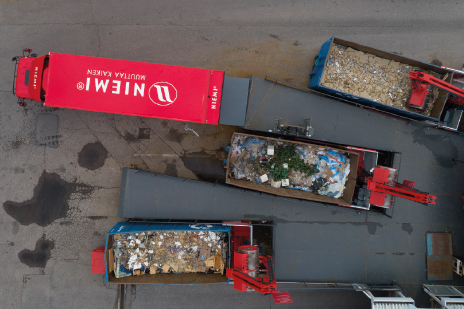
Director Esa Niemi, of Finnish mover Niemi, agrees that demands from customers for sustainability are increasing – but says that many business owners are also driving progress independently, not least because they see it as a differentiator and example to industry peers. He adds: ‘The owners and top management at our company have made sustainability a priority for us… it is important for us to be a pioneer in environmental protection and lead the way for other companies.’
A driving force
The primary focus for environmental change, initially, has been the ‘greening’ of vehicles at the centre of the moving process, particularly road transport – largely because of the perceptions held by customers about the impact of trucks. Neumann says businesses must educate consumers about the progress made on this front. ‘Many moving companies have highly modern fleets with low emissions and efficient fuel consumption,’ he says, adding that Streff’s entire fleet meets Euro 6 emissions standards.
Niemi is another to have switched all of its vehicles – 150 of them – to non-fossil fuels as part of a drive to eliminate the company’s particulate emissions by 2030. Around a quarter of the business’s vehicles run on biogas, a renewable Finnish fuel with ‘no particulate emissions’. ‘A few of our vehicles are all electric and the rest of our fleet runs on Neste MY Renewable Diesel, reducing greenhouse gas emissions by up to 90 per cent compared with traditional diesel fuel,’ says Esa Niemi. The company is also introducing charging stations for electric cars and vans at its Helsinki premises.
Wolfgang G Makurat, of Brauns International, says the process of becoming more environmentally friendly is continuous. The firm has so far converted 50 per cent of its company car fleet to e-cars and all of its trucks to Euro 6 models (the latest addition, an Actros, uses 25 per cent less fuel than its predecessor).
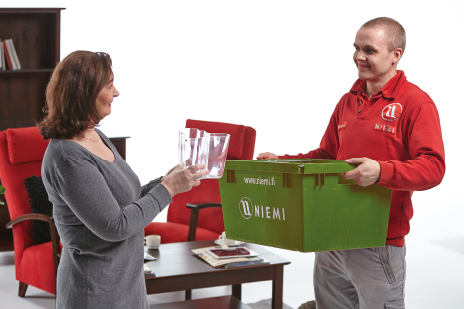
‘We are looking forward to 2025, when we will, hopefully, take delivery of our first hydrogen truck,’ Makurat says. ‘And if our dream comes true, we will produce the gas on our own premises by extending the solar power outlet we have already installed on our warehouse.’ The company will be able to generate additional revenue from any leftover energy, which will be sold onto the national grid.
Fighting fires
Another way companies can look to lessen the impact of their vehicles is to use a carbon-offset scheme. In the wake of the Australian bush fires of 2019-20 – a reminder of the devastating impact of climate change – Grace Worldwide Australia partnered with Greenfleet, an environmental not-for-profit organisation that offsets emissions with a programme of reforestation across Australia and New Zealand, planting native biodiverse forests.

‘With nearly three billion animals and 272 plant species, including 100 threatened and 22 critically endangered species, lost in the bushfires, it was time to act,’ says Grace’s Managing Director, Steven Brown. ‘By partnering with Greenfleet, we are confident that our climate action provides genuine and lasting environmental benefits.’
The company says that, by April this year, it had already offset 1,657 tonnes of carbon – or the equivalent of removing 385 average-sized cars from the road for a year.
Through Greenfleet, Grace built on this activity and continues to plant a tree for every container that enters its facilities during 2021.
This planting is taking place at Dangerbridge, south-east Queensland, and the trees will provide the habitat, food and diversity needed by the recovering koala population in the area.
Grace expects to continue its partnership with Greenfleet into the future.
Tackling packaging
A second focus for the industry is packaging and other materials, with movers taking measures to reduce their use, reuse or recycle.
At its Windhof sorting premises, Streff – which is ISO 45001:2018-certified – separates 35 categories of material for recycling, including paper, cardboard, metal and polystyrene. Some of these are compressed on site to reduce the amount of transport needed to take them away. A reuse strategy that also maximises the time that valuable resources are used for within a business is an essential part of environmental sustainability.
Neumann gives an example: ‘We only use high-quality cardboard boxes from recycled, FSC-certified carton. Because of the quality, and the fact that they usually can be built and closed without using any tape, we can reuse them for several moves.’
Bjørn Carlsen, CEO and Managing Director of NFB International Relocation, says the company has responded to the Norwegian government’s environmental push, while incorporating sustainability into its everyday operations. ‘In December 2009, Oslo received the distinction of being the third-greenest city in Europe. Subsequently, Norway has enforced rules and regulations, and facilitated and organised reception depots for all kinds of waste,’ Carlsen says.
The company separates office and packing materials for recycling, and has written this best practice into its crew operations manual and corporate responsibility statement
Niemi also has ambitious objectives for its waste, with a goal that none of its recyclable materials end up in landfill. ‘The materials are primarily reused, and secondarily recovered as energy. Our results for reusing materials are excellent; about 90 per cent of recycled products we receive will be reused,’ says Esa Niemi.
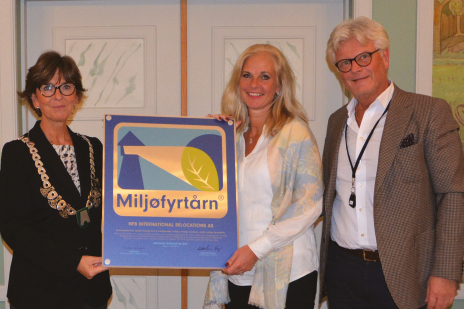
Facilitating others
Niemi also facilitates the sustainability efforts of its corporate clients – who can recycle office tables, chairs and shelves through the company and its recycling partners – and consumers, who can recycle clothes, bags, rugs, kitchenware, electrical equipment, and sports and camping equipment, among other items. Similarly, Streff helps its customers recycle – or redistribute for reuse – old office furniture, recently handling almost 200 tonnes for two clients and gaining SuperDrecksKëscht (Super Waste Bin) status from Luxembourg’s Ministry of the Environment, Climate and Sustainable Development. This makes it a certified provider of waste disposal services (see Regional Focus feature, pages 44-51.
Neumann says: ‘Every moving company can act on the production, reuse and/or recycling of waste – especially on packing materials. This requires careful sourcing of materials, as well as optimisation of processes.’
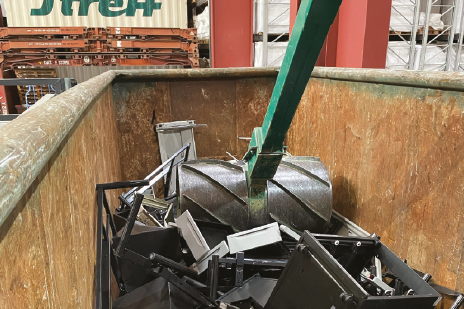
Future power sources
The third focus is the heating, lighting and powering of buildings, and Streff shows the kind of action movers can aspire to, or have in progress already. Most of the company’s premises are heated using chipped wood, geothermal energy or solar power, while the business plans to cover almost all of its electricity needs by extending the number of solar panels on one of its warehouses. It also uses transparent roof panels and white plastic covers on pallets to boost available daylight in its warehousing.
Niemi has also made bold plans on the power front, aiming to run all its premises on wind or solar power within this year. Its new office at Tampere was designed with the environment in mind, too, and uses only renewable energy sources, while being geothermically heated and cooled.
Top tech
Innovation in the transport, packaging and power sources used by movers will be supplemented by further technology-enabled developments, notably in the pre-move survey.
Virtual surveys were an exploratory area before the pandemic, but last year they became essential. Having quickly reconciled any doubts that this method could work, movers have realised that, as well as protecting employees and transferees from COVID-19, virtual surveys save time and money – and are better for the environment.
NFB’s Carlsen says most of its surveys are now virtual, cutting many road miles from the company’s monthly total and lessening time out of the office.
‘From an environmental and an efficiency point of view, our video survey solution works like a charm,’ he says. ‘Down from about 30 physical surveys a month to barely five to 10.
‘Additionally, we can now do pre-move surveys worldwide, without bothering our trading partners. From the comfort of our own offices, we can now do a survey in Singapore, Rio de Janeiro or New York.’
Meanwhile, Niemi says: ‘We will continue to take sustainability issues into account. We will investigate all new innovations around sustainability to see whether they are suitable for us.’
An ongoing process
When creating ‘environmentally sustainable’ businesses, it will never be a case of ‘destination reached’, but rather a process of continuing progress. Statutory obligations for firms to reduce their carbon impact will increase, and the environmental stakes will only get higher. Moving firms must monitor their activities and carry on improving to ensure they meet the targets demanded of them in the months ahead.
On top of this, as these examples demonstrate, most movers aren’t just responding to legislation; they are going further – sometimes in anticipation of further tightening of the rules, but also because it is ‘the right thing to do’.
This could provide an interesting differentiator in the market: most customers will have their own legal or moral commitments, too, and are increasingly likely to seek out service providers who are aligned.
Those moving and relocation firms that act from a sense of responsibility and passion for a clean environment can reap the rewards. As part of an industry working at the heart of international business, they also have a huge opportunity to set a leading example on environmental best practice to operators around the world.
Case study: NetMove
Brazilian Affiliate NetMove International set the environmental standard for other movers in the country more than 10 years ago, when it founded the ECOMOVE socio-environmental programme, aiming to reduce the waste being created on each move.
Company owner Arnaldo Petarnela says: ‘We all know that a well-packed and protected move requires good packing material, most of the time in great quantities. The programme was created thinking about how we could mitigate the waste created by each move, without interfering with the high quality of our services.
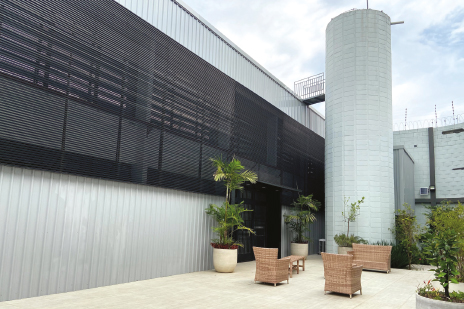
‘The idea was to raise the awareness of our operational teams, employees, partners, suppliers and customers that a quality move and protection of the environment can, and should, go together.’
Since its inception, the initiative has driven the reuse of boxes, wooden crates and packaging materials left over after moves into Brazil, or during domestic moves, and the use of reusable materials, such as blankets for protecting furniture. Boxes that have reached the end of their useful lives are sold to NetMove’s supplier, which recycles them into new packaging.
Petarnela says: ‘Our operational teams are carefully trained to select the boxes and materials from import moves that are in excellent condition and reuse them for local moves, which require less transportation time and less handling, so they do not affect the quality of our services.’
He adds that, according to performance questionnaires at the end of each of the project’s moves, the claim ratio is ‘close to zero and the customer satisfaction index is very high’.
The company launched the project near its headquarters in São Paulo, but the pilot proved so successful that it was rolled out across Brazil. NetMove encourages all its partners to get involved – and, so far, 98 per cent of its customers have – receiving lower rates as a benefit for using the second-hand boxes and an ECOMOVE certificate of participation.
ECOMOVE is just one of the initiatives to be born from the company’s long-held environment-focused approach.
Petarnela says: ‘Since our early days, we have encouraged the operational and administrative teams, employees, partners, suppliers and customers to contribute to the environment by raising awareness of the importance of simple daily measures that can change our future – such as saving water and other natural resources, avoiding disposable plastics, and recycling as much as possible, in our company and at home.’
When the business moved to new premises in 2019, it set about making it as green as possible, ‘reducing negative impacts by preserving natural resources, improving quality of life, and creating an environment that is liveable, comfortable, safe, and productive’.
NetMove’s new facility is solar-powered, has large windows to maximise the use of natural light, and is equipped with used-water cisterns, so water can be reused for cleaning and washing trucks. It also contains metallic plates that ‘reduce noise and control temperature, avoiding, on most days, the usage of air conditioning’.
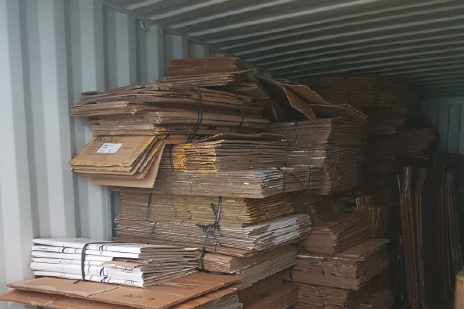
‘Everything was created with focus on sustainability and on the comfort of our team and our guests,’ says Petarnela.
ECOMOVE and NetMove have won a series of plaudits, including the American Chamber of Commerce’s ECO Award in 2017 and runners-up certificates for International Moving Company of the Year at The Americas EMMAS – Expatriate Management and Mobility Awards (the first in the Latin American region), and PAIMA’s Juan Peralta Ecology Award.
What’s your sustainability story? Text: Do you have an exciting sustainability initiative to tell in FIDI Focus? It can be environmental, social or HR focused. Please let us know at: Magali.Horbert@fidi.org

